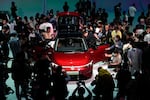The European Union is set to impose duties on imports of electric vehicles from China by Thursday after talks between Brussels and Beijing failed to find an amicable solution to their trade dispute.
Electric vehicles have become a major flashpoint in a broader trade dispute over the influence of Chinese government subsidies on European markets and Beijing’s burgeoning exports of green technology to the bloc.

Attendees take a close look at the Volkswagen ID.7 Vizzion, a new electric flagship sedan during a world premiere on the eve of the Auto Shanghai 2023 show in Shanghai, China, Monday, April 17, 2023. Global and Chinese automakers plan to unveil more than a dozen new electric SUVs, sedans and muscle cars this week at the Shanghai auto show, their first full-scale sales event in four years in a market that has become a workshop for developing electrics, self-driving cars and other technology.
Ng Han Guan / AP
“By adopting these proportionate and targeted measures after a rigorous investigation, we’re standing up for fair market practices and for the European industrial base,” European Commission Executive Vice-President Valdis Dombrovskis said on Tuesday.
“In parallel, we remain open to a possible alternative solution that would be effective in addressing the problems identified and (World Trade Organization)-compatible,” he added. The duties would stay in force for five years, unless an amicable solution is found.
According to the commission, which manages trade disputes on behalf of the 27 EU member countries, sales of Chinese-built electric cars jumped from 3.9% of the EV market in 2020 to 25% by September 2023, in part by unfairly undercutting EU industry prices.
The duties on Chinese manufacturers will be 17% on cars made by BYD, 18.8% on those from Geely and 35.3% for vehicles exported by China’s state-owned SAIC. Geely has brands including Polestar and Sweden’s Volvo, while SAIC owns Britain’s MG, one of Europe’s bestselling EV brands.
Other EV manufacturers in China, including Western companies such as Volkswagen and BMW, would be subject to duties of 20.7%. The commission has an “individually calculated” rate for Tesla of 7.8%.
The EU’s retaliatory duties have run into opposition in Germany, which has Europe’s biggest economy and is home to major automakers.
The head of Germany’s auto industry association, VDA, said the imposition of the tariffs is “a setback for free global trade and so for prosperity, the preservation of jobs and Europe’s growth.” Hildegard Müller said the move increases the risk of a far-reaching trade conflict.
“The industry is not naive in dealing with China, but the challenges must be resolved in dialogue,” Müller said in a statement.
The commission says China boosted its EU market share with the help of subsidies across the production chain. These ranged from cheap land for factories provided by local governments, to cut-price supplies of lithium and batteries from state-owned enterprises, to tax breaks and easy financing from state-controlled banks.
The rapid growth in China’s market share has sparked concern in the EU that Chinese cars will eventually threaten the EU’s ability to produce its own green technology to combat climate change. Business groups and unions also fear that the jobs of 2.5 million auto industry workers could be put in jeopardy, as well as those of 10.3 million more people whose employment depends indirectly on EV production.
Associated Press correspondent Geir Moulson contributed from Berlin.
